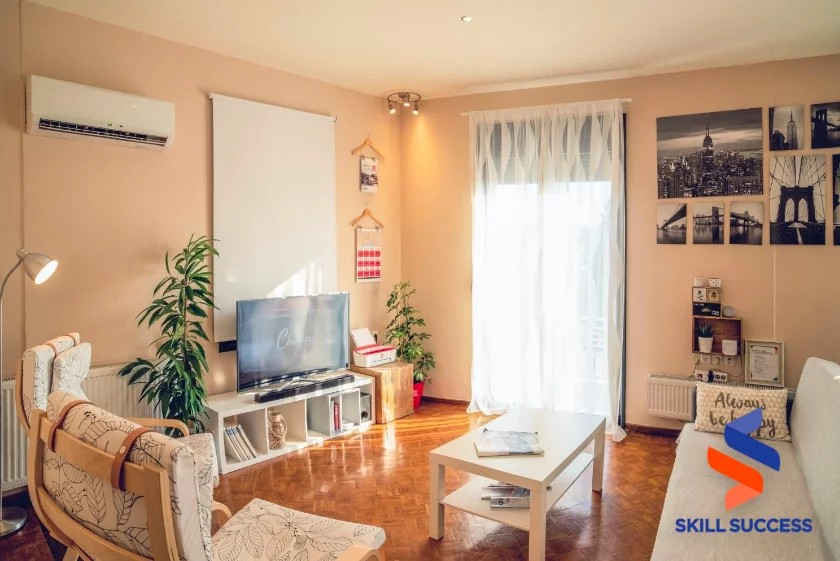If you're not familiar with Airbnb, it means Air Bed and Breakfast. It is an online platform where you can lease your property—whether it's a room, RV, apartment, or treehouse—for long-term and short-term stays. It's a digital marketplace that links Airbnb hosts and travelers looking for affordable temporary accommodation.
Airbnb is all the rage for both business and leisure travelers. With the sharing economy becoming a global phenomenon, and if you're looking into becoming an entrepreneur, it would be a mistake to skip on this Airbnb hosting business opportunity to earn extra income and expand your network.
If that doesn't pique your curiosity, here are a couple of success stories of Airbnb hosts that might catch your attention.
Airbnb hosting business success stories
Reading about inspiring Airbnb hosting stories will give you a glimpse of the ins and outs of having an Airbnb rental home.
Kristen & Siya
Kristen and Siya started as Airbnb guests, but they quickly realized that it was an opportunity waiting for them.
Their hosting journey began during the pandemic when traveling stopped—affecting their income-generating projects. They were worried about their bills and mortgages, so they brainstormed business ideas to keep themselves afloat.
They needed a passive income business, then realized they were sitting on a goldmine. The house that they just bought in one of the tourist spots in Ontario could bring them some profit by leasing it out on Airbnb.
They immediately went to the drawing board to put together a full-proof Airbnb business plan pricing their vacation home between $8,000 to $10,000 per month—depending on the season. Then, they cleaned the entire house, took pictures, and signed up to be a host.
Oddly, they received 13 inquiries in less than 24 hours in the middle of a global health crisis. They managed to pay their monthly dues, and maintain their lifestyle.
Vincent and Eve
A Jersey couple realized that renting their spare rooms on Airbnb is more lucrative than having long-term tenants.
In 2010, Vincent and Eve bought a four-bedroom home in Long Branch, New Jersey. They loved the idea that their house was only a 10-minute walk from the beach and a 20-minute walk from the oceanfront shopping and dining center. But it dawned on them that they bit off more than they could chew.
They decided to lease the three spare rooms on the ground floor to long-term renters while living on the second floor. To them, it was the perfect supplemental income instead of paying the mortgage for a space that they're not using. After six years, they gave Airbnb hosting a shot renting their rooms on a short-term basis which doubled their income from $15,000 per year to $30,000.
They found it more profitable than their initial business plan of having long-term occupants earning them $90,000 in net income.
Why is it important to create an Airbnb business plan?
There are over 4 million hosts on Airbnb globally, so having a concrete Airbnb business plan is essential to help you focus and narrow down on the necessary steps to put your ideas in motion. It'll help you categorize enormous tasks into achievable short-term milestones.
A business plan is not only for corporations and big businesses. No matter how small your business is, it will guide you in formulating and executing an idea that enables you to communicate to potential investors to secure capital. Not only that, studies prove that it will grow your business 30% faster.
Some people are reluctant about writing a business plan, thinking it isn't necessary. But many experts beg to differ because a well-documented easy-to-follow operational plan can make your vision tangible.
Although this information sounds overwhelming, a business plan shouldn't be complex. Here are some simple steps on how to create an Airbnb business plan.
How to create an Airbnb business plan
You don't want to enter a business blindly. A well-crafted Airbnb business plan will prompt you to make the right decisions when situations become problematic.
Go over these steps to get you started on your Airbnb hosting business.
1. Visualize your mission
A mission statement will remind you why you want to start an Airbnb business in the first place. Ask yourself these questions:
- Why do you want to open an Airbnb business?
- What value can you provide your customers?
- How do you want to operate your business?
When things get rough, your mission statement will help you see the positive side of your daily task, and it'll realign you to your vision. It can be as simple as "Your home away from home; giving you a localized Airbnb experience."
2. Think of your target market and location
You can streamline your business plan by identifying your niche because it allows you to promote your Airbnb rental easier. Knowing who your customers are can help you assess where you want to buy your Airbnb property. Nonetheless, you can visualize your target market based on your current setting if you already have a property.
Imagine your guest persona with these questions below.
- Are they entrepreneurs, tourists, or students?
- How old are they?
- Are you accommodating group, family, or individual travelers?
- Are they holidaymakers, digital nomads, or long-term travelers?
Now that you know who your renters are, these questions won't only guide you to find the perfect Airbnb location. But it also lets you be a considerate neighbor by adhering to your country-specific laws. And at the same time, offering your customers an outstanding Airbnb experience.
- Where is your Airbnb home located?
- What's the demographic living in your area?
- What are the laws in your neighborhood regarding Airbnb hosting?
- What brings people to your city/town?
- What type of property are you leasing out?
- What are your amenities?
3. Allocate your Airbnb budget
Setting a detailed and realistic budget for your Airbnb home allows you to build your business within your means so you can still turn a profit. You have to consider property cost—if you're planning on buying a property—which includes mortgage, insurance, taxes, and utilities. Plus, furnishing, linens, and towels.
Your budget will let you see if you need to get a loan. Or you'll need investors for your Airbnb hosting business.
TIP: Host Financial is a lending company that loans people venturing into a short-term and long-term vacation rentals.
4. Name your Airbnb rental business
Some people say that a business name isn't that important. But having a moniker can help your customers identify and recommend your business. It should be unique and memorable to captivate your target audience.
Business names hold power. It can either make or break your business; because it may send off a negative or positive tone to your target market.
Check the Airbnb website for the list of Airbnb business names around your area. Stay away from hard-to-spell brand names to avoid confusion when renters research your Airbnb home online.
5. Set your legalities in order
Experienced Airbnb hosts suggest applying for a Limited Liability Company (LLC) when establishing an Airbnb business which allows you to be flexible concerning profit and tax distribution and managing decisions. It offers a lot of liability protection like asset security.
- Taxes. Being a U.S. company, Airbnb requires its hosts who have U.S.-sourced income to give their taxpayer information. However, if you're not a U.S. citizen and don't have a U.S. Airbnb listing, you're not subject to U.S. tax reporting. Filing for Airbnb taxes will depend on your location. Airbnb has a collect and remit feature that handles occupancy tax. It's crucial to inform your guests of the precise amount of taxes you're charging them. Be sure to track all your expenses to make tax filing less time-consuming.
- Permits & Licenses. Before listing your Airbnb home, it's important to know about the jurisdictions in your city, state, territory, or country. Some cities have zoning or administrative code that may restrict short-term rentals, but other cities allow you to apply for a permit to operate.
- Other things you have to consider are your business license. And meet the building and housing standards of your local area. Some jurisdictions may require some inspection of your property if you're meeting the minimum regulations on safety and habitability.
As more and more people invest in Airbnb homes, government policies are also changing and adapting their laws on short-term vacation rentals. Though these rules may seem confusing, you can ask for advice from a consultant.
TIP: If you can, avoid investing in condos for your Airbnb rental because they can change their rules at any given time.
6. Open a business bank account
Having a designated bank account for your Airbnb hosting business drives all your business transactions in one place. Enabling you to distinguish business financial activity from personal expenses.
7. Apply for business insurance
Airbnb rental property owners are always at risk of unexpected events. Having reliable insurance can help you with costly damages. Airbnb offers its host community $1 million in protection coverage called AirCover, but experts suggest it shouldn't replace traditional business insurance.
In contrast, Homeowners insurance only covers natural disaster damages. It's advisable to ask your insurer about these policies before launching your Airbnb business.
8. Survey and buy your property
People book Airbnb due to its accessibility—for tourist attractions or businesses. If you already have an idea of where to buy your Airbnb property, or if you already have one, you may want to look into the pricing of other Airbnb properties around your area. You want to keep a competitive price because if you price your Airbnb home too high, people might not consider booking you. Alternatively, if you price it too low, it may take a long time for your return on investment.
9. Sign up for your Airbnb listing
Before signing up for your Airbnb listing, curate your home interior and take quality photos to upload to Airbnb's website.
Add brief and concise captions about your property to give your guests a clear vision of your space. Include all your amenities in the description area of your property listing. Some guests may value having a kitchen, high-speed internet, or jacuzzi, so it's beneficial to enclose them for a higher chance of booking.
Be sure that you have a clear definition of your hosting style so you can welcome guests on your terms. You can create your house rules like; which areas in your property are guests allowed to enter, the number of guests allowed per night, quiet hours, or if your home is pet-friendly.
10. Surpass customer expectations
You should think about how you want your guests to feel when they book your Airbnb listing. Consider offering their needs even before they think of it because there might be items that your guests might forget. Making your guests feel valued is more likely to book again.
Automation is another aspect that will exceed customers' expectations. There are online tools to help you organize guest communication. As travelers sometimes need instant communication regarding their bookings, having automated messages for basic customer inquiries can save you and your customer's time.
Offering discount coupons upon giving you honest feedback allows your renters to book you again when they return.
Learn how to start an Airbnb business
If you're new to the Airbnb hosting business or want to improve your hosting style, here are a few Airbnb business courses.
Create An Airbnb Experience Today
 Course Rating
0/5
Course Rating
0/5
Creating a memorable Airbnb experience is vital to keeping your clients satisfied. In this course, you'll learn how to monetize your passion for hosting experiences while simultaneously making valuable connections. Here you'll learn to utilize Airbnb to its fullest potential and get your hosting experience approved.
Take this courseHow To Create A Tourism Experience - A Complete Guide
 Course Rating
0/5
Course Rating
0/5
If you're passionate about sharing experiences in your local area, this course will give you the rundown on how to offer a uniquely memorable escapade tailored to each Airbnb guest. Additionally, you'll learn how to make a career or form a supplemental income through guided tours and tourism experiences.
Take this courseSecrets Of The Sharing Economy
 Course Rating
5/5
Course Rating
5/5
If you want to get away from juggling two or more jobs to make ends meet, it's time to take advantage of the rising sharing economy. This course will show you how to use different online platforms to turn your underused assets into income-generating businesses.
Take this courseAirbnb is a stepping stone that pushes you to become an entrepreneur. It gives you the chance to exploit the new and thriving sharing economy.
Airbnb isn't only an online marketplace that offers accommodations, but it's also a platform that presents different hosting opportunities custom-built to your passions. All you need to do is to put together a foolproof business plan.
Though formulating an Airbnb business plan may seem demanding, it's not impossible. You can find a mentor and take online courses to help you seize the moment.


